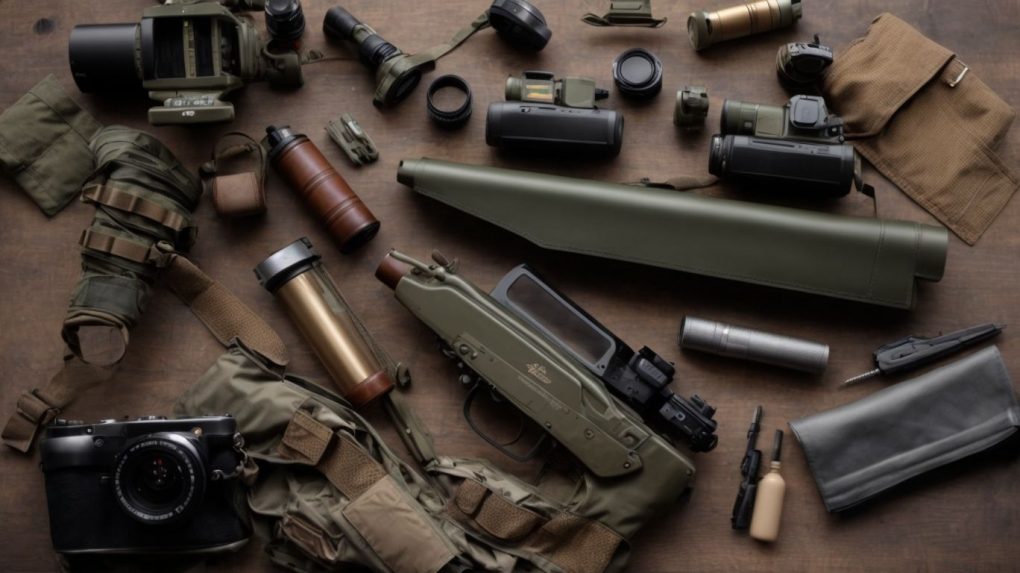Regarding special military operations, having the right gear can make all the difference between success and failure.
Key Takeaways:
- Night vision devices are essential for successful military operations in low-light environments, providing the ability to see and move in the dark.
- Tactical communication systems are crucial in maintaining communication and coordination among military units during operations.
- Protective gear, such as body armor and helmets, is necessary to protect soldiers from physical harm and increase their chances of survival in combat situations.
1. Night Vision Devices (NVDs)
Night Vision Devices (NVDs) are crucial in modern military operations, offering soldiers enhanced visibility in low-light conditions.
These devices have come a long way since their early versions, which were bulky and limited in functionality. The evolution of NVD technology has been instrumental in enhancing the effectiveness of military strategies, allowing operations to be conducted seamlessly during nighttime or in poor visibility scenarios.
The United States military has been at the forefront of developing cutting-edge night vision capabilities, investing heavily in research and advancements to stay ahead of adversaries. From the first-generation image intensifiers to sophisticated thermal imaging systems, NVDs have revolutionized how armed forces engage in covert operations.
The integration of night vision technology has not only improved situational awareness. Still, it has also reshaped tactical maneuvers and battlefield dominance for the military, setting a new standard for modern warfare.
2. Tactical Communication Systems
Tactical Communication Systems are essential for seamless coordination and information sharing among military units during complex operations.
These systems play a crucial role in ensuring that vital messages are transmitted securely and efficiently between troops, commanders, and other personnel in the field.
Over the years, there has been a significant evolution in communication technology within the military, from basic radio systems to sophisticated digital networks.
The advent of advanced communication systems has revolutionized how information is relayed on the battlefield, enabling real-time updates, enhanced situational awareness, and improved decision-making processes.
BDT (Battlefield Digital Terminals) have emerged as key components in enhancing tactical communication capabilities, allowing seamless voice, data, and video transmission integration.
3. Protective Gear
Protective gear is a critical component of military equipment, ensuring the safety and survivability of personnel in hostile environments.
Regarding military operations, the types of protective gear used are diverse and meticulously designed to provide optimal protection to soldiers. Each piece serves a distinct purpose, from ballistic helmets that shield the head from shrapnel to body armor vests designed to absorb and disperse the impact of projectiles.
Advanced protective technologies such as composite materials, nanotechnology, and innovative designs have revolutionized how soldiers are safeguarded on the battlefield. These advancements significantly enhance soldier safety and improve their chances of survival in combat situations.
4. Firearms and Ammunition
Firearms and Ammunition are integral to the operational readiness and effectiveness of military units, such as SEAL Team 6, offering firepower and tactical advantages on the battlefield.
Regarding elite military units like SEAL Team 6, the choice of weaponry is of utmost importance. These specialized forces rely on a range of firearms, including pistols, rifles, sniper rifles, and even heavy machine guns. Each weapon serves a unique purpose, from close-quarter combat to long-range precision strikes. The selection process involves an in-depth analysis of capabilities, reliability, and compatibility with mission objectives.
Maintaining these firearms in top condition is a constant priority. Regular cleaning, servicing, and adherence to manufacturer specifications ensure optimal performance in high-stakes operations. Specialized ammunition rounds, such as armor-piercing or tracer, further enhance the unit’s combat effectiveness.
5. Optics and Scopes
Optics and Scopes provide precision targeting and enhanced situational awareness for military personnel, with innovations like the L3Harris ENVG-B revolutionizing optical capabilities.
Advanced optics and scopes are crucial in modern military operations, allowing soldiers to spot and engage targets with unparalleled accuracy and efficiency.
Advancements in optical technology have allowed scopes to be equipped with features such as night vision, thermal imaging, and built-in rangefinders, enhancing overall operational effectiveness.
By integrating cutting-edge scopes like the ENVG-B, military units can achieve heightened operational success rates by quickly adapting to dynamic battlefield conditions and swiftly neutralizing threats.
6. Load-Bearing Equipment
Load-bearing equipment enhances soldier mobility and comfort by efficiently distributing the weight of essential gear and equipment.
Regarding military operations, selecting load-bearing equipment is crucial for ensuring that soldiers can carry out their tasks effectively and with minimal physical strain. These specialized pieces of gear are meticulously crafted to accommodate various necessities, ranging from ammunition and medical supplies to communication devices and navigation tools.
One of the key considerations in the design of load-bearing equipment is its compatibility with other pieces of gear, such as body armor or backpacks. Customization is vital in tailoring the equipment to individual needs and preferences, allowing soldiers to perform their duties efficiently without discomfort or restricted movement.
7. Tactical Clothing
Tactical Clothing is designed to provide protection, camouflage, and utility for military personnel operating in various environments.
One of the key features of tactical clothing is its durability, which is critical for withstanding the rigorous demands of combat scenarios. Specialized fabrics like ripstop nylon and Cordura are commonly used to ensure resilience against tears and abrasions.
The strategic design of tactical clothing is crucial in enhancing soldier performance. Functional features such as multiple pockets for convenient storage of tools and essentials, reinforced knees and elbows for added protection, and moisture-wicking materials to regulate body temperature are all meticulously incorporated to support operational efficiency.
Adaptive clothing is essential in catering to diverse mission requirements, offering modular components that can be interchanged based on the specific needs of varying terrains and climates.
8. Medical Kits and Supplies
Medical Kits and Supplies are critical tools for providing immediate medical care and enhancing the survivability of military personnel, particularly elite units like SEAL Team 6.
In military environments, these kits consist of various essential items tailored to address injuries common in combat scenarios. These include wound dressings, tourniquets, airway management tools, medications, and specialized equipment like thermal blankets and burn dressings. Medical supplies in these kits are carefully selected to handle trauma, excessive bleeding, respiratory distress, and other life-threatening conditions.
As elite forces often operate in remote and hostile environments, having access to sophisticated medical kits can make a vital difference in securing the outcome of critical missions. Sustaining combat effectiveness relies heavily on prompt and effective medical intervention, making these kits essential for elite military units navigating high-risk operations.
9. Survival and Outdoor Gear
Survival and Outdoor Gear are essential for ensuring the self-sufficiency and resilience of military personnel during extended missions or in challenging environments.
These gear encompass various tools and equipment designed to help military units thrive in various scenarios. From water purification systems to specialized medical kits, survival gear technology advancements have revolutionized how soldiers navigate difficult terrains.
Integrating GPS devices, lightweight shelters, and high-caliber communication gear has significantly increased the odds of survival in adverse conditions. Such gear must maintain top-notch quality and reliability, as any malfunction can have dire consequences in a critical situation.
10. Navigation Tools
Navigation Tools play a vital role in guiding military operations, enabling precise movement, coordination, and communication among personnel in the field.
In the United States military, various sophisticated navigation tools are employed to ensure operational success. These tools range from GPS systems that provide accurate position data to advanced mapping software that aids in route planning and terrain analysis. The integration of these technologies allows military units to navigate complex environments with efficiency and security. These tools are essential in facilitating swift decision-making and real-time adjustments during missions.
11. Survival and Outdoor Gear
Survival and Outdoor Gear are essential for ensuring the self-sufficiency and resilience of military personnel during extended missions or in challenging environments.
These gear items encompass various tools and equipment designed to help individuals survive and thrive in harsh conditions. From essentials like food rations, water purification tablets, and first aid kits to advanced gear such as GPS devices, night vision goggles, and tactical communication systems, military units rely on various survival gear to fulfill their missions effectively.
The constant evolution of technology has revolutionized the design and functionality of survival equipment. Modern gear features lightweight materials, compact designs, and innovative features like solar-powered chargers and water-resistant fabrics. These advancements enhance performance, reduce the burden on soldiers, and increase their operational efficiency.
Conclusion
The advancement of Night Observation Devices (NODs) and other specialized equipment underscores the continuous evolution of technology in the military industry, enhancing operational capabilities and ensuring the readiness of military forces.
The integration of advanced communication systems, drones, and sophisticated cybersecurity measures has revolutionized how modern militaries operate in the digital age. Unmanned Aerial Vehicles (UAVs) equipped with high-resolution cameras provide invaluable reconnaissance capabilities, while cyber defense mechanisms protect sensitive data from potential threats.
The development of lightweight body armor, ballistic helmets, and advanced medical kits has significantly improved soldier survivability, allowing for enhanced protection and rapid medical assistance in emergencies.


